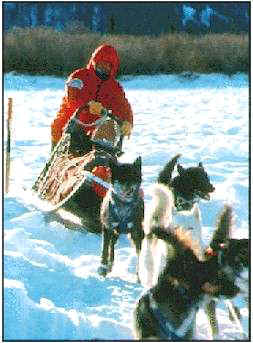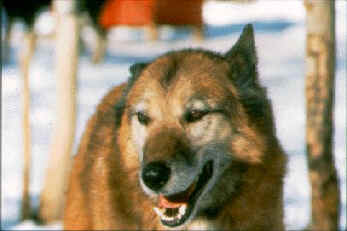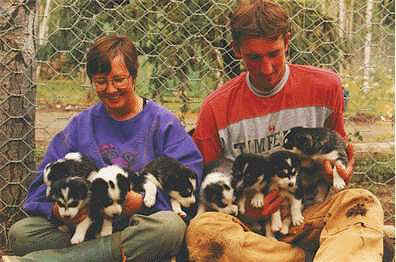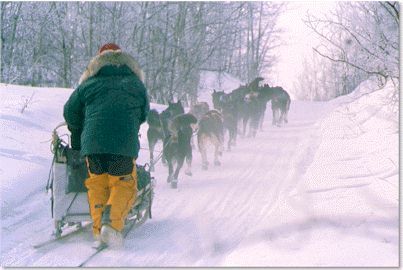Meet Yukon Quest Champion Frank Turner
Name:
Kennel Name:
Birthplace:
Home Town:
Occupation: |
Frank Turner
Muktuk Kennels
Toronto, Ontario, Canada
near Whitehorse, Yukon
Musher, tour guide |

Introduction
My wife, Anne, and I live
about a half-hours drive from Whitehorse, Yukon, near Lake LaBerge (made famous by Robert
Service). Between us, we have one son -- Saul (18), two daughters -- CindyAnne and Wendy
(both adult); one foster daughter, Candice (11); and three grand-daughters -- Cheylsea
(6); Katelynn (2.5); and Tayler (1). Our dog-family consists of 71 dogs, 33 of which train
for the Yukon Quest.
We also have two older
horses and two cats (who keep the puppies in line). We are lucky to have several handlers
who help with all the chores and training, and Anne teaches university courses full-time
at Yukon College. When I am not training for the Quest, I am either guiding or working
with Selkirk First Nation.
I often visit local schools
with a couple of dogs, to talk about trying to do your best. And I help raise funds for
the Learning Disabilities Association of Yukon.
Background
What is your primary sled dog
activity or area of interest?
The challenges of the Yukon Quest and
operating the highest quality touring operation.
How long have you been involved
with sled dogs?
For 23 years, nearly a quarter of a century.
What sparked your initial
interest in sled dogs?
Hard to say, perhaps Sgt. Preston of the North stories that I heard as a kid.
Probably it was just a natural fit for me, given my love of dogs and love of the outdoors.
If you remember your very first
time behind a team of dogs, tell us about it.
My first sled was one I found up Slim's Creek. It had steel runners and lots of
nails. I thought it was historically significant, but unfortunately it didn't last too
long. I don't remember my first run clearly, but I am sure that it involved a lot of
coaxing of leaders and trying to avoid tangles. I do remember the team, my first five
dogs.
Who have been your mentors?
When I started mushing, in the mid seventies, attitudes about how to develop dogs teams
were a lot different than today. Unfortunately I tried some of those methods. They were
not for me, and certainly not for the dogs. I shifted my focus from those who see sledding
as some sort of macho activity to those who truly seemed to enjoy themselves and were
successful in terms of team management -- and those people were mainly women. I think
women have been profoundly influential in shaping the sport of sledding as it is today. I
really enjoyed running with Linda Forsberg and Kate Persons, for example.
| Kennel Management What size kennel do you operate?
In our kennel, there are 71 dogs. About 33 of those are training for the Yukon
Quest (two teams, 28 dogs, will run the race). There are about 8 retired dogs, several of
whom wander loose (and get into a little mischief now and then), 6 puppies (6 months), and
the rest run in our touring teams. Our oldest dogs are about 13 or 14, and they are great
(one finished the Quest at 12!!).
What type of tether/bowl system
do you use?
We use chains on swivel posts for most of the dogs. Our puppies are in open pens, and
females in heat are put into closed pens (with floors and covered roof...). We also have
pens for "sick bay". For whelping bitches, we have special open pens with large
dog houses, large enough for four or five dogs. The puppies stay in those areas until they
learn how escape... We use stainless steel bowls, and sometimes have to go on treasure
hunts in the tunnels that our more energetic dogs create. |

Getting over some rough ice near McCabe Creek, between Carmacks and Pelly
Crossing.
(Laurent Dick photo) |
What are the most important
considerations in housing sled dogs?
For us, the most important consideration is the dog's ability to move around and to play
with other dogs. All our dogs can reach at least two neighbours to play. Also, we make
sure there is good bedding and protection from the elements (not facing prevailing winds).
We also try to build houses that will last, and we always use screws (not nails).
Give us an overview of your
feeding program.
Our feeding program is built around an excellent Canadian kibble, Techni-Cal. Everything we do depends on that food.
We supplement with a number of products, particularly during the racing season. One thing
we use is Winner's Edge Vitamin-Mineral top
dressing. We also use Kokoheart (coconut oil) which is very readily and quickly digested
in the stomach, and we add Winner's Bee Pollen to the mix before and during the race. We
water in the mornings, with some food for flavour, and give the main feed in the evenings.
In the winter, we add fat for snacks, and
the colder it gets the more fat they get (we really like using half&half pork fat).
For snacks, our dogs get bison heart,
bison tongue, salmon, tuna, chicken skins, and pork fat. They also get cookies, using a
very special recipe (Technical, ground bison heart, Bee Pollen, Winner's Edge, Kokoheart,
and other ingredients).
Summarize your basic kennel
management style.
Our basic management style is based on conditioning and positive reinforcement.
We use rewards, and very rarely use any discipline. We believe in making sure our dogs are
happy (first) and well-conditioned (second). Our training schedule is flexible, so that if
weather conditions take a turn for the worse, we don't stress out about laying the dogs
off an extra day. And if the dogs "aren't into it", we don't force it. That's
not to say we don't ensure that they work, but when they clearly do not want to go for a
run, we go back home (it's safer in the long run, we believe).
The Dogs
What breed(s) do you work with?
Breed is not as important as the race record of the dog and its temperament. I
look for dogs that are race proven, or that come from proven stock. But we also look for
dogs with good temperaments. Theoretically, you should breed to the dogs that consistently
beat your team.
What physical characteristics do
you look for in your dogs?
Our dogs are fairly large, compared to many other distance teams. We look for
dogs of similar build, with fairly muscular structure.
What mental or emotional
attributes do you require in your dogs?
We look for enthusiasm and gentleness, and a strong work ethic. With our own
pups, we start establishing trust relationship with pups when they are three weeks of age.
Tell us about an all time
favorite dog or two:
That is really difficult for me. One of my older dogs, Jazz, was badly injured as
a very young puppy. My father was visiting me, in Pelly Crossing, and he backed his
station wagon over Jazz's back leg. The vets in Whitehorse could not repair the leg, so we
flew her to Vancouver. After much surgery, she returned. Because of the surgery, she had
not hair on her hind quarter, so she spent the next winter in my cabin. I never expected
her to run in a team, but she turned into a great dog, with a lot of heart. She ran lead
for me for several years, and completed several Quests!

Grizzlie, aged 12 years,
finished the 1997 Quest. (now retired)
(Laurent Dick photo) |
Grizzlie, is another amazing
dog. He has run about 8 Quests. He is now over 14, and retired. At the ripe old age of 12,
he completed the Quest in our B Team that year. That would be like running the Boston
Marathon at 90-something! Until last summer, Grizzlie was always a serious digger -- Anne
called him the excavator. He would dig a moat around his house, about 8 feet deep and 20
feet across -- amazing!! |
Puppies
What criteria do you use for
selecting breeding stock?
We look for race proven dogs, and work with line breeding.
Do you use any pre-training
evaluation of puppies?
We give every pup a chance to perform. We don't make judgments on observations
made outside the actual work conditions. I park biases at home.
What method do you use for
starting pups?
We take our puppies for walks, loose, as soon as they are able to scramble over
logs. We work with them on voice commands and encourage them to run and have fun. When
they are about six to eight months old, we start to harness them up. We start by walking
them on the line, with a person (not a leader) in front, and someone else on the sled. If
they take easily to the line, we put one or two pups in with a team of older, retired
dogs, and gradually introduce them to runs, using lots of treats (pockets full of hot
dogs....).
What is the most important thing
you look for in a young dog?
Attitude. Attitude. Attitude.
At what point do you decide a
youngster is likely to make it in your team?
We seldom make a final decision on a given dog. Sometimes a dog that does not do well at
two, will develop into a good trotter at three or four. And the reverse may also occur.
Often we are trying to determine what a given dog needs to excel.
Occasionally a dog will have the wrong
build for distance mushing -- too big or too small -- and sometimes they will have a
medical condition that prevents them from racing. We always find out what they will be
good at (house pet, rec team, etc.).

Anne and a handler have their arms full of puppies!
(Erik Simanis Photo)
Training
What is the training/racing
philosophy of your kennel?
Attitude is everything. The physical conditioning process is pretty
straightforward. And you need good nutrition. But the key is positive attitude. Don't
overload leaders. Confiburation (pairing) of dogs is critical.
Also, we work on proactive low-risk
management on trails, making sure that our summer and winter trails are well groomed.
Don't look for trouble.
In racing conditions, I think it is
important to minimize strategic decision making errors. Try not to beat yourself.
Do you have specific training
goals for your team(s)?
The goal is always to try and achieve our maximum performance levels, not below,
not above, but right on.
What do you consider most
important to accomplish in training?
A primary key for good training programs is consistency. At the same time, it is important
to vary the runs and not to over-train. Dogs do not benefit from an approach that is too
mechanical. We believe it is important to learn to "read" our dogs effectively
and to base ongoing training on what you see in front of you. We choose quality over
quantity when it comes to training miles.
What is the most indispensable
training equipment you use?
You need a well-made, maneuverable sled and a really reliable hook. For the dogs,
harnesses that fit well are important, and for our racing conditions you must have
excellent booties. We have tried a lot of booties over the years, but now use only the Mountain Ridge ones (they make excellent harnesses and
dogcoats also).
The key to equipment is not to have any
weak points!
Racing
How do you choose which races to
enter?
I don't like to over race. The Quest is usually enough for me. The rest of the
time, we enjoy non-competitive mushing.
What are your strengths as a
racer?
The older I get, the less sleep I seem to need.
Do you having a mushing career
goal?
Happy dogs.
What does it take to win?
To win requires a lot of excellent preparation (training and planning), excellent
implementation of a game plan, making the right decisions at the right time, and having
things "go your way."
To win you must not be afraid to "go
for it," and a strong belief in your team.
To win you must take care of all of the
small things well, and there must be exceptional fine-tuning.
You must also have a great team of
supporters and handlers.
Most important, you need a wonderful
group of exceptional canine athletes.

Nearing the end of
the Yukon Quest, 1997.
(Laurent Dick photo)
The Future
What can individual mushers do to
support and promote the sport?
Visit schools and 4-H clubs. Encourage people to visit your kennel. Provide
excellent care of your dogs and let people see that care at work.
What part do clubs and
organizations play in sport development?
If run well, they can be very important. They can feature speakers on health,
nutrition and care. They can also encourage networking among participants in the sport,
and open communication.
What advice would you give a
beginning musher?
Find a mentor and learn all you can. Handle for the best musher you know and learn all you
can from them.
Anecdote
Tell us about one or two of your
most memorable sled dog experiences.
There was the time I forgot my thermos, half-way along the Quest trail....
The time I was driving without glasses
and went to grab a bootie off the trail, only to discover it was .....well, a turd...
The time Bruce Johnson and I were running
together in the Quest, and Bruce patted all my dogs before heading out after a snack
break.... when I pulled the hook, I realized he had also undone all their tuglines ...
The first time the race went through
Circle Hot Springs, and several mushers stopped for a swim ... after, I went up and lay
down, since a nap seemed the thing to do. Several hours later I woke up to find everyone
else had left right away ....
The first time the Quest ran to
Fairbanks, and I didn't know how long the trail ran along the Cheena River. After what
seemed like hours of winding around with lights on the horizon, I finally camped ....
within a couple miles of the finish... with my crew waiting at the finish line with donuts
wondering what had happened to me....
Comments
Any final comments about sled dog
sports?
When you have 71 sled dogs, it is not just a sport. It is a way of life. They are
family and we owe everything to them.

Muktuk Kennels Web Site
Yukon Quest Web Site
Muktuk Kennels SDC Kennel Ad
[back
to Interview list]

top of page |
home |
feedback | search

|



